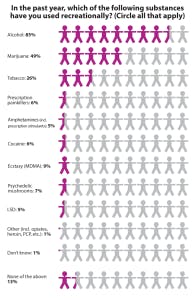As throngs of students coming from pre-games and “darties” swarmed the Main Green for Spring Weekend, another group was avoiding the muddy mess altogether. At the W. Alton Jones Camp in West Greenwich, around 70 substance-free students went hiking, played sports and even found some time for homework.
Though events like Spring Weekend and Halloween may make substance use feel prevalent on campus, around 20 percent of students identify as substance-free, according to Tanya Purdy, the director of BWell Health Promotion. But according to The Herald’s Fall 2017 undergraduate poll, the number might be closer to 8 percent.
That poll found that four in five Brown students drink alcohol, whereas a 2014 national survey found just three in five college students do. The pressures to drink or use drugs can shift over students’ time at Brown, pushing them toward communities of people who share their values.
[infogram id="097aedba-bf53-407b-83ef-ee0d842b3bd5" prefix="Gco" format="interactive" title="Fall 2017 Herald Poll Substance Use"]
Within these disparate friend groups, certain on-campus groups provide a college experience removed from the substance use that is typical to Brown. Founded this year, the club “SoBear” has become a refuge for substance-free students on Brown’s campus.
“Most clubs I found, if there wasn’t substance use happening at the clubs, kids were talking about it,” said AJ Davis ’20, the president and founder of SoBear. Davis spent his time with friends he had made in his substance-free housing, often heading off campus on weekends “because (campus) was a bit toxic.” He founded SoBear to create a strong community of sub-free students by hosting events like the Spring Weekend camping retreat.
Sub-free communities exist beyond SoBear, too. This year, the University gave students the opportunity to live in Donovan House, a substance free program house located in the former Plantations House.
“The house itself fosters a community for students who are sub-free (and whose) sub-free identity is very important to them to the point where it affects how they want to live,” said Kiana Phillips ’19, a residential assistant in Donovan House.
While these groups help sub-free students connect with each other, freshmen new to Brown are often left searching for friends that hold similar interests and values.
“I have seen the aftermath of someone who has had too much alcohol and gone beyond their limits,” said Poom Pipatjarasgit ’21, a sub-free student. “It does sometimes get lonely on weekend nights.”
While freshmen can be lost in the mix, older sub-free students can attest that the pressure of using substances fades over the years of attending the University.
“As you get older and spend more time here, you solidify your friend groups,” Davis said, echoing the experiences of other sub-free students who became more comfortable throughout their time at Brown. “You know how to navigate those situations better.”
Freshmen feel the most pressure to overuse substances. To combat this, BWell ensures that all first-years receive alcohol training, Purdy said.
Many students try substances for the first time at college. Those who did drink or use drugs in high school are more likely to do so in college, according to Angelo DiBello, assistant professor of behavioral and social sciences.
Health Services sees binge drinking rates increase during a student’s first semester, especially the first six weeks, a phenomenon Purdy referred to as “The College Effect.”
“We try to be careful and provide really intentional education during that time,” she added.
Manny Dallas ’18, said that he spent more time drinking during his first two years, when it felt more “novel then than it is now.”
“Your freshman year, you’re not cemented in these friendships … (and) there is an element of wanting to feel comfortable with people you don’t know so well,” he added. “As you mature, you’re more comfortable being sober with people you don’t know.”
[caption id="" align="alignright" width="295"]
Within its educational initiatives, the University attempts to encourage safe drinking rather than cracking down on drinking entirely. Students can use substances in a healthy way, Purdy said. Brown’s rates of substance use align with peer institutions and New England in general, which sees higher rates of alcohol and marijuana use compared to the rest of the United States.
Henry, a senior who asked only to be identified by his first name because he feared professional repercussions, had little experience with drinking before he arrived at Brown, yet he quickly found himself immersed in nightly parties full of new people. At one of these parties, Henry had his first real drink.
But Henry found that parties are not a necessity when it comes to social life. “You meet people when you go out, but you don’t necessarily get to know somebody,” Henry said.
As students’ time at Brown goes by, some may feel that they outgrow substance use. One student, granted anonymity by The Herald because he feared professional repercussions, began smoking marijuana in high school. He started dealing drugs during his sophomore year of college for income and to supplement his own drug use. But after his grades suffered, the student decided to stop dealing and even began using less to focus on his schoolwork.
After four years at Brown, Henry ultimately feels nonchalant towards substance use. “If you do it responsibly and you’re not getting into patterns of clear abuse … alcohol and drugs can find a role in your life that helps you keep a balance,” he said.
Once Henry made friends, any pressure to drink disappeared. “Over time you realize that you don’t need to,” Henry said. “There’s much less of that (pressure) once you start making friends and having a group where you’re comfortably able to have a more quiet weekend.”
ADVERTISEMENT




